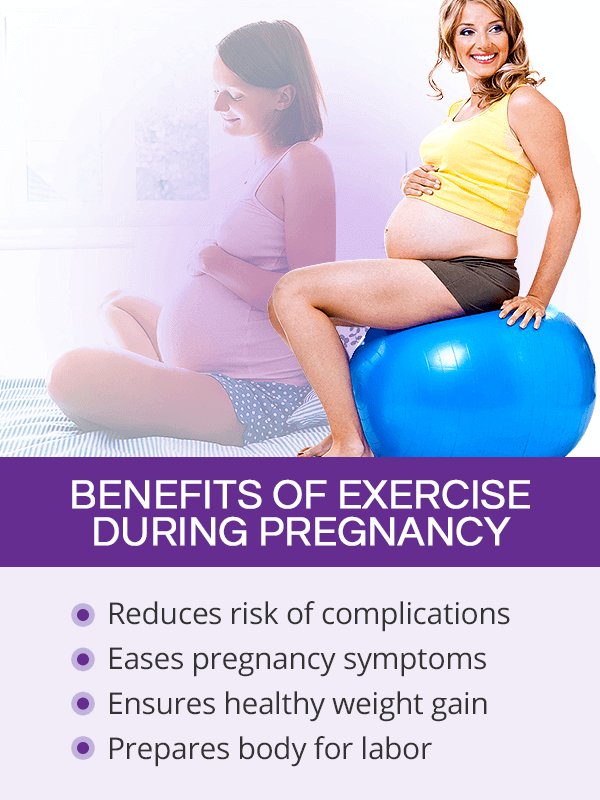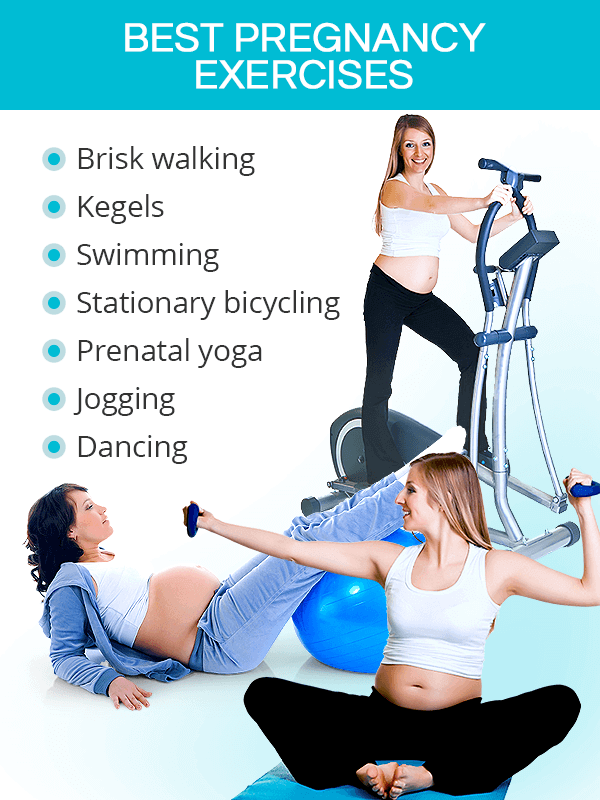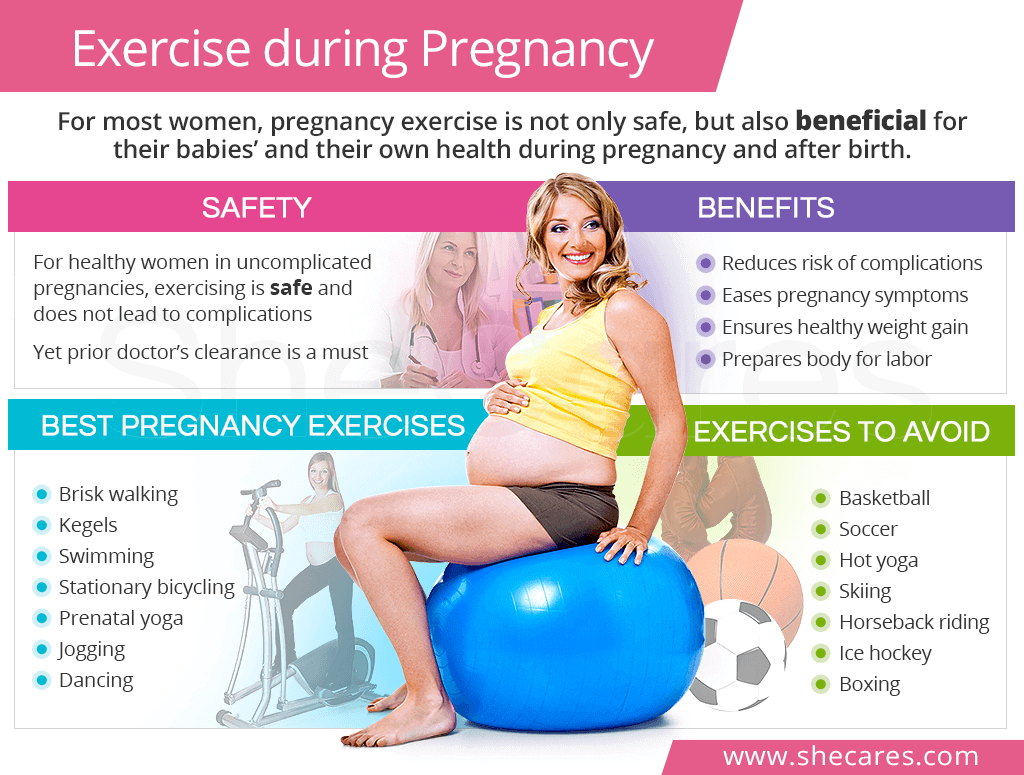Is It Safe to Exercise While Pregnant?

The American College of Obstetricians and Gynecologists states that for healthy women in uncomplicated pregnancies, exercising during pregnancy has not been found to carry a risk of pregnancy complications, like miscarriage, low birth weight, or premature birth.1
However, some expectant mothers might be advised against pregnancy exercise, including those carrying multiples and at risk of preterm labor as well as those with preeclampsia, anemia, or placenta previa, among other contraindications.
In all cases, a woman should obtain clearance and personalized instructions on pregnancy exercise from her doctor during the first prenatal visit.
Benefits of Exercise during Pregnancy

Studies have found that the benefits of exercise during pregnancy not only help women endure the demands of childbearing, but also extend into postpartum in the following ways:2
- Reduces the risk of pregnancy complications, like gestational diabetes or preeclampsia
- Eases pregnancy discomforts, like back pain, bloating, or constipation
- Promotes healthy and steady weight gain during pregnancy
- Boosts mood and energy, reduces stress and anxiety, and improves sleep
- Strengthens heart and improves circulation
- Prepares the body for labor and delivery
- Allows for faster recovery after birth
Best Pregnancy Exercises

How a woman approaches exercising during pregnancy mainly depends on two factors: her pre-pregnancy exercise routine and the progression of her pregnancy.
As long as there are no doctor-given contraindications, she can go about staying active, keeping the following in mind:
If she was active before getting pregnant, she should be able to continue her routine while pregnant.
If she is new to exercise in pregnancy, it is best to start slowly and gradually build up to the recommended 150 minutes of moderate-intensity aerobic workouts per week.1
Since the center of gravity changes in pregnancy and might place extra strain on the joints, muscles, and lower back, the following are the best examples of beneficial and safe exercises during pregnancy:3
- Brisk walking
- Light jogging
- Swimming
- Pelvic tilt exercises
- Kegel exercises
- Pregnancy yoga
- Stationary bicycling
- Prenatal Pilates
- Squatting
- Dancing
Running while Pregnant
Although running while pregnant has been shown safe, it should be practiced in moderation and with common sense. Women who were used to running before getting pregnant might continue doing so throughout the various stages as long as it feels good and does not lead to exhaustion. Wearing a well-fitted sports bra and comfortable running shoes as well as adjusting the intensity of jogging sessions are also key.
For beginner runners, however, pregnancy is not the best time to start, and they would benefit from other pregnancy exercises in a safer way.
Other Recommendations
All physical activities during pregnancy should be approached with proper hydration in mind. Because overheating can lead to complications and dehydration, wearing loose, breathable clothes during workouts; drinking water before, during, and after exercising; and taking time to catch a breath are essential. An adequate pregnancy diet is also key.
Exercises to Avoid During Pregnancy

When choosing pregnancy exercises, common sense and self-observation play a huge role. Sometimes a seemingly safe workout can turn out dangerous for pregnant women if performed too strenuously or in an unsafe environment.
While it is impossible to provide an exclusive list, as a general rule, pregnancy workouts to avoid require those that involve heavy lifting or standing for prolonged periods of time; increase the risk of falling or abdominal trauma; or involve substantial pressure changes.
As such, injury-prone sports and high-impact exercises to avoid during pregnancy include the following:4
- Ice hockey
- Basketball
- Mountain climbing
- Horseback riding
- Soccer
- Boxing
- Skiing
- Scuba diving
- Hot yoga
- Sky diving
Words of Caution
While exercise has proven beneficial for most women, unforeseen complications can still potentially arise. Consequently, staying safe in pregnancy requires a great deal of vigilance and immediate communication with one's doctor if experiencing the following:2,5
- Dizziness
- Heart palpitations
- Vaginal bleeding
- Excessive fatigue
- Headache
- Swelling
- Sudden changes in baby's movements
- Other alarming or painful symptoms
Key Takeaways
For mothers who are exercise veterans, continuing working out while pregnant requires only small, if any, modifications. For other expectant mothers, pregnancy is the best motivation to begin taking care of their physical and mental health through exercise. While some might be advised to take it easy and avoid exercising, most women are cleared to do so and can enjoy the many benefits pregnancy workouts bring, including lower risks of complications, healthier pregnancy weight gain, and faster recovery postpartum, among others. The best exercises for pregnant women include brisk walking, swimming, and prenatal yoga, whereas sports to steer clear of are heavy lifting, basketball, or horseback riding. As with all other choices a woman makes during pregnancy, common sense and diligence are key to staying safe and protecting one's baby's health.
Sources
- American Pregnancy Association. (2019). Exercise During Pregnancy. Retrieved August 8, 2019 from https://americanpregnancy.org/pregnancy-health/exercise-during-pregnancy/
- March of Dimes. (2017). Exercise during Pregnancy. Retrieved August 8, 2019 from https://www.marchofdimes.org/pregnancy/exercise-during-pregnancy.aspx
- Mayo Clinic. (2019). Pregnancy and exercise: Baby, let's move! Retrieved August 8, 2019 from https://www.mayoclinic.org/healthy-lifestyle/pregnancy-week-by-week/in-depth/art-20046896
- Pregnancy, Birth & Baby. (2018). Exercising during pregnancy. Retrieved August 8, 2019 from https://www.pregnancybirthbaby.org.au/exercising-during-pregnancy
- U.S. Department of Health and Human Services. (2018). Physical Activity Guidelines for Americans. Retrieved August 8, 2019 from https://health.gov/paguidelines/second-edition/pdf/Physical_Activity_Guidelines_2nd_edition.pdf#page=79
Footnotes:
- American College of Obstetricians and Gynecologists. (2019). Exercise During Pregnancy. Retrieved August 8, 2019 from https://www.acog.org/Patients/FAQs/Exercise-During-Pregnancy?
- Better Health Channel. (2018). Pregnancy and exercise. Retrieved August 8, 2019 from https://www.betterhealth.vic.gov.au/health/healthyliving/pregnancy-and-exercise
- American Pregnancy Association. (2019). Exercise and Pregnancy. Retrieved August 8, 2019 from https://americanpregnancy.org/pregnancy-health/exercise-and-pregnancy/
- Sports Health. (2015). Exercise in Pregnancy: A Clinical Review. Retrieved August 8, 2019 from https://www.ncbi.nlm.nih.gov/pmc/articles/PMC4622376/
- American Journal of Lifestyle Medicine. (2014). Guidelines for Physical Activity during Pregnancy: Comparisons From Around the World. Retrieved August 8, 2019 from https://www.ncbi.nlm.nih.gov/pmc/articles/PMC4206837/
